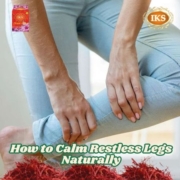How to Calm Restless Legs Naturally: Saffron for Restless Legs Syndrome (RLS)
How to Calm Restless Legs Naturally: Saffron for Restless Legs Syndrome (RLS)
How to Calm Restless Legs Naturally – Restless legs syndrome (RLS) is a condition characterized by an uncontrollable urge to move the legs, often accompanied by uncomfortable sensations.
This article explores how saffron can be a natural remedy for restless legs, including its benefits, usage, and other natural approaches to manage the symptoms effectively.
🌼 Take Action for Your Health! Purchase saffron today and enjoy the natural benefits for your restless legs!
Understanding Restless Legs Syndrome (RLS)
What is Restless Legs Syndrome?
Restless legs syndrome is a neurological disorder that affects millions of people worldwide. Individuals with RLS experience an irresistible urge to move their legs, particularly during periods of inactivity or rest. Symptoms often worsen at night, leading to sleep disturbances and daytime fatigue.
Symptoms of RLS
The symptoms of RLS can vary in intensity and may include:
- Unpleasant sensations in the legs, often described as creeping, crawling, or tingling.
- An irresistible urge to move the legs, particularly in the evening or at night.
- Difficulty sleeping due to discomfort, leading to insomnia or poor sleep quality.
- Relief of symptoms when moving the legs, such as walking or stretching.
Causes and Risk Factors
While the exact cause of RLS is often unknown, some potential contributors include:
- Genetics: RLS can run in families.
- Iron deficiency: Low iron levels in the brain can contribute to RLS symptoms.
- Chronic diseases: Conditions like diabetes, kidney failure, and peripheral neuropathy are associated with RLS.
- Medications: Certain medications, including antihistamines and antidepressants, can exacerbate symptoms.
🥇 Choose Quality Saffron! Buy now for the best quality saffron to help with your restless legs!
How Saffron Can Help with RLS
Research suggests that saffron may help alleviate RLS symptoms through several mechanisms:
- Mood Enhancement: Saffron has been shown to improve mood and reduce symptoms of anxiety and depression, which can exacerbate RLS.
- Anti-inflammatory Properties: The anti-inflammatory effects of saffron may help reduce discomfort and improve overall well-being.
- Antioxidant Effects: Saffron’s antioxidant properties may protect nerve cells, potentially alleviating symptoms associated with RLS.
Using Saffron for Restless Legs
Recommended Dosage
While there is no specific dosage for using saffron to treat RLS, studies typically suggest a daily intake of 5 to 7 threads of saffron. It’s advisable to start with a lower dosage and gradually increase as needed, while always consulting with a healthcare professional.
How to Incorporate Saffron into Your Diet
Saffron can be incorporated into your diet in various ways:
- Saffron Tea: Steep a few strands of saffron in hot water for a soothing drink.
- Saffron Milk: Add saffron to warm milk for a comforting bedtime beverage.
- Culinary Uses: Incorporate saffron into dishes like risottos, paellas, and desserts for flavor and color.
Precautions and Side Effects
Zaffran is generally considered safe in culinary amounts. However, excessive intake can lead to potential side effects, such as:
- Nausea
- Dizziness
- Allergic reactions
Always consult with a healthcare provider before starting any new supplement, especially if you are pregnant, nursing, or have underlying health conditions.
🌙 Sleep Better Tonight! Purchase saffron and take the first step towards a good night’s sleep!
Other Natural Remedies for Restless Legs
Lifestyle Changes
In addition to saffron, several lifestyle changes can help manage RLS symptoms:
- Regular Exercise: Engaging in moderate physical activity can reduce symptoms and improve sleep quality.
- Sleep Hygiene: Establishing a regular sleep schedule and creating a comfortable sleep environment can help minimize symptoms.
- Avoiding Stimulants: Limiting caffeine and nicotine, especially in the evening, can help reduce RLS symptoms.
Dietary Changes
Certain dietary choices can also impact RLS:
- Iron-Rich Foods: Including foods like spinach, lentils, and lean meats can help address iron deficiency.
- Magnesium and Potassium: Foods rich in magnesium (nuts, seeds) and potassium (bananas, avocados) may help relax muscles and reduce symptoms.
Relaxation Techniques
Incorporating relaxation techniques into your daily routine can help manage stress and anxiety, which may exacerbate RLS:
- Mindfulness and Meditation: Practicing mindfulness can help calm the mind and reduce discomfort.
- Yoga and Stretching: Gentle stretching or yoga can alleviate muscle tension and improve circulation.
Herbal Remedies
Several herbal remedies may complement the use of saffron:
- Valerian Root: Known for its calming effects, valerian root may help improve sleep quality.
- Chamomile: Drinking chamomile tea can promote relaxation and aid in sleep.
10 GRAMS 100% PURE ORIGINAL AUTHENTIC PREMIUM TOP BEST HIGH QUALITY A+++ GRADE IKS KASHMIRI SAFFRON (KESAR / KUMKUMA PUVVU / KUNGUMAPOO / KUMKUMPUVVU / ZAFFRAN) FOR RESTLESS LEGS
Conclusion
Restless legs syndrome can be a challenging condition, impacting sleep and overall quality of life. While saffron shows promise as a natural remedy for alleviating RLS symptoms, it’s essential to approach treatment holistically.
Incorporating lifestyle changes, dietary adjustments, and relaxation techniques can further enhance symptom relief. Always consult with a healthcare professional before making significant changes to your health regimen.
Incorporating saffron into your daily routine may provide comfort and relief for restless legs naturally, allowing you to enjoy a better quality of life.
✨ Order Saffron Today! Unlock the soothing benefits of saffron for restless legs!









Leave a Reply
Want to join the discussion?Feel free to contribute!